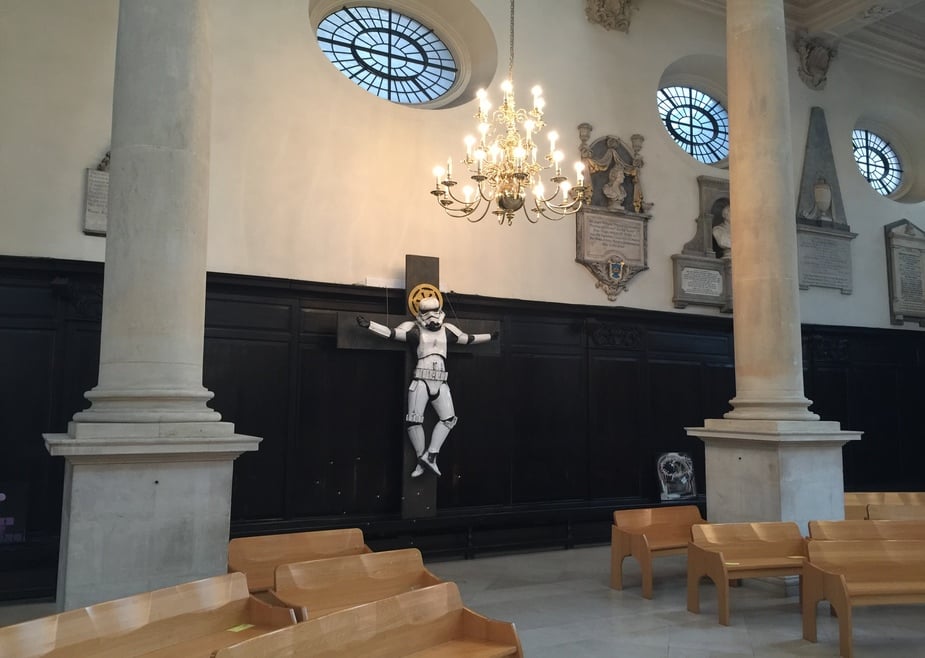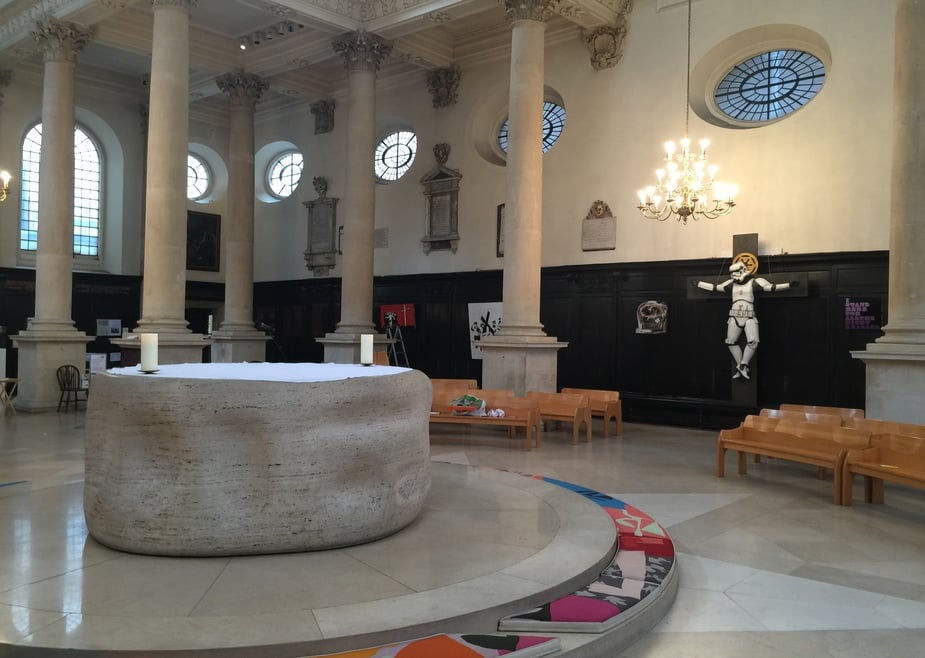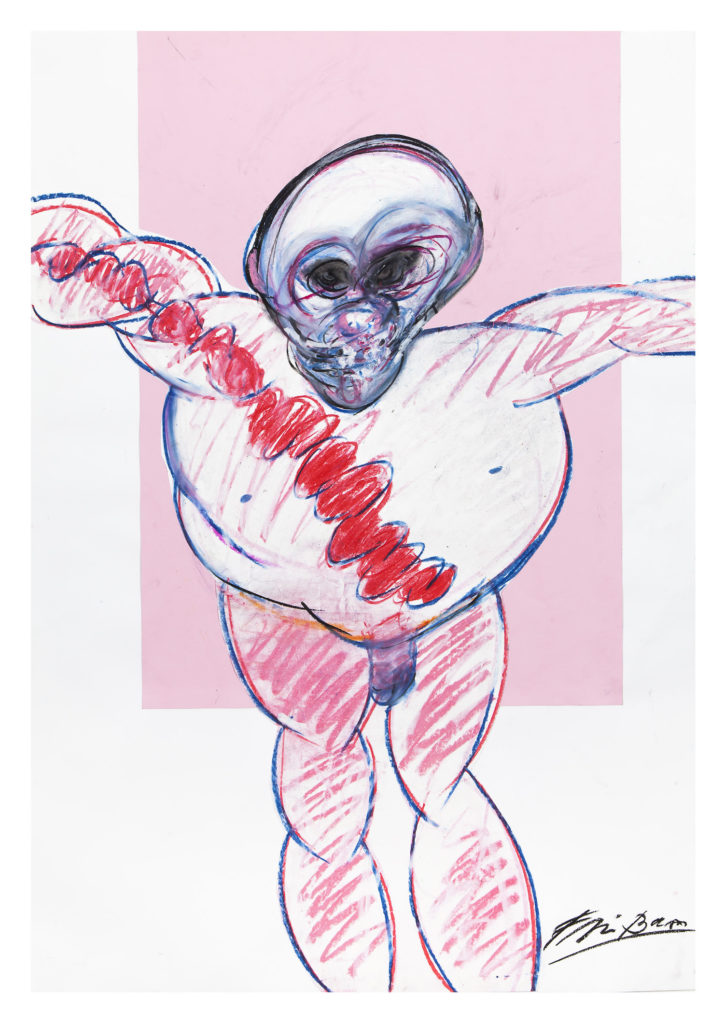On View
A Crucified Stormtrooper Sculpture Is Sidelined in a Church Exhibition Following Parishioner Outcry
Originally a centerpiece of the show, the artwork will now be moved to a less-prominent place in the church.

Originally a centerpiece of the show, the artwork will now be moved to a less-prominent place in the church.

Sarah Cascone

A “Stations of the Cross” exhibition at a London church will open as planned on Thursday, but it will need a new centerpiece: A life-size statue of a crucified Imperial stormtrooper—which was originally set to be a featured work at the church’s altar—is getting something of a demotion. Following complaints from parishioners, the work has been moved to a less-prominent place ahead of the show’s opening.
The piece, simply titled Crucified Stormtrooper, is the work of street artist Ryan Callanan, better known as RYCA. Inspired by the Star Wars film franchise, which began in 1977, the artist has cast an anonymous stormtrooper in the role of Jesus, nailed to a wooden cross.
The sculpture, priced at £12,000 ($16,750), is set to be part of the “Stations of the Cross” exhibition organized by Art Below at London’s historic St. Stephen Walbrook church. Less than 24 hours after its initial installation, following an outcry from the community after morning mass, the church indicated that it had decided to remove the controversial piece. A representative from the church later clarified, however, that the work would instead be moved to a new location away from the altar.

RYCA, Crucified Stormtrooper on view in its original location at St. Stephen Walbrook church in London as part of “Stations of the Cross.” Photo courtesy of Art Below.
“[Crucified Stormtrooper] was larger and more prominent than was anticipated when the exhibition was approved. Its position in the church as currently installed has proved to be distracting for some worshippers,” the representative told artnet News via email. “As a result, following discussions with the curator, we have asked Art Below to reposition the work, so that it remains prominent but it is less of a distraction from the altar.”
At this point, objections to sci-fi-inspired crucifix should come as little surprise to the RYCA. He showed a much smaller version of the work at a London gallery in 2014 and faced similar concerns about blasphemy. “It’s not making fun of any particular religion and certainly not Christianity,” he told the Romford Recorder at the time, claiming that the sculpture was commenting on the expendable nature of Star Wars‘ faceless stormtroopers, who are “cannon fodder” for the Empire’s cause.
Speaking to artnet News via Facebook, the artist made a similar argument in the wake of the most recent controversy. “This is a crucified stormtrooper and has nothing to do with religion. It is not a method of capital punishment reserved for the son of God,” he wrote. “This work is like many of my works, using symbology and pop culture and mixing them up to create a new narrative.”
Ben Moore, Art Below’s founder and curator, believes the work speaks to a narrative shared by both Star Wars and Christianity. “It’s symbolic that in Star Wars: The Force Awakens (2015), we saw a stormtrooper escape from the Dark Side to come and support the rebellion,” he said in a statement. “The Crucified Stormtrooper plays into the notion of forgiveness.”
Moore previously curated crucifixion-themed art exhibitions in 2014 and 2015. The most recent edition, at London’s St. Marylebone Parish Church, also courted controversy with For Pete’s Sake, a life-size marble sculpture that replaced Jesus on the cross with English musician and Libertines frontman Pete Doherty. All three shows were organized in support of the Missing Tom Fund, dedicated to finding Moore’s brother Tom Moore, missing since 2003.
RYCA’s sci-fi-inspired crucifix was not the only work to come under scrutiny at “Stations of the Cross.” The church was also said to be considering taking down several works featuring nudity by Francis Bacon, Paul Benney, and Ricardo Cinalli. The church later clarified that it had “made no suggestion that the work by Francis Bacon is inappropriate or could be removed.”

Francis Bacon, pencil and collage on paper. Courtesy of Art Below.
The Bacon, one of 14 works included in the show, is a pastel drawing from the collection of the artist’s lover Cristiano Lovatelli Ravarino. Sebastian Horsley and Ben Eine are among the 14 total featured artists.
“This is an exhibition of images designed to provoke thought from artists grappling with their response to the challenge and scandal of Christ’s cross,” said Reverend Jonathan Evens of St. Stephen Walbrook in a statement, defending Stormtrooper Crucifixion. “For me, this image raises similar questions to those which CS Lewis raised in his science fiction trilogy i.e. that, were other races to exist on other planets, would Christ be incarnated among those races in order to die for their salvation?… [This is a work] that can open our ideas and minds to new reflections on the eternal significance of Christ’s sacrifice.”
When RYCA believed the work wouldn’t be displayed, he called the censorship “a sign of the times,” and was hopeful that the work will rise again. “Maybe it will resurrect in a few days,” he said. Luckily, it didn’t take that long.
Art Below’s “Stations of the Cross” is on view at St. Stephen Walbrook, 39 Walbrook, London, March 15–23, 2018.